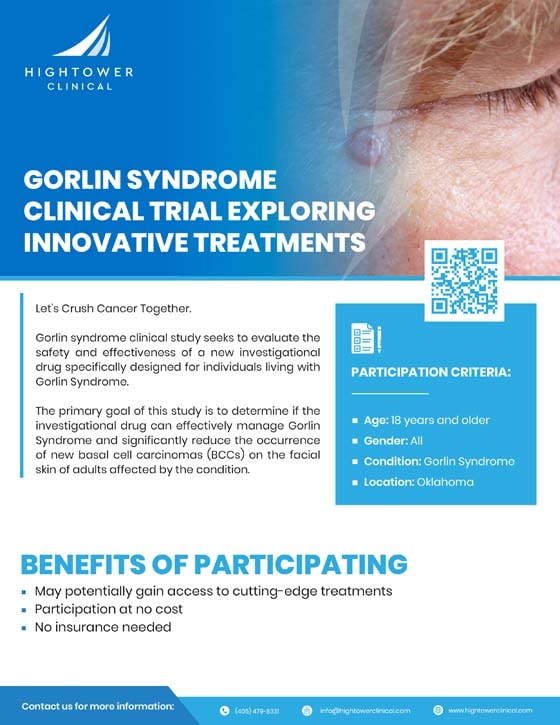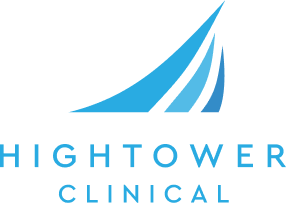Gorlin Syndrome, also known as basal cell nevus syndrome, is a rare genetic disorder caused by mutations in the PTCH1 gene. This condition significantly increases the risk of developing basal cell carcinomas (BCCs), a type of skin cancer.
Gorlin Syndrome Clinical Trials in Oklahoma City, OK
Gorlin Syndrome clinical trials are paving the way for exploring potential treatments to manage the disease.
Enroll Now
Living with Gorlin Syndrome?
You May Qualify for Gorlin Syndrome Clinical Trials in Oklahoma City, OK
Gorlin Syndrome is a rare genetic disorder that leads to the development of multiple basal cell carcinomas (BCCs), especially on the face. Despite advancements in understanding the condition, there remains a significant need for improved treatments to manage its wide-ranging effects.
At Hightower, we are currently conducting phase 3 clinical trials to explore the safety and efficacy of a topical investigational drug for individuals with Gorlin Syndrome.
*Participation in the clinical trial is completely free and entirely voluntary. *
*To participate, fill out the form above, and a member of our research staff will contact you to determine your eligibility for the clinical research study. *
Gorlin Syndrome
| Study Name | Protocol Number | Sponsor |
|---|---|---|
| Gorlin Syndrome | Sol-Gel Technologies |
Gorlin Syndrome Clinical Trials
In partnership with pharmaceutical companies, Hightower Clinical is conducting a clinical trial to evaluate the safety and efficacy of an investigational drug for individuals with nevoid basal-cell carcinoma or Gorlin syndrom.
The phase 3 Gorlin syndrome clinical trial aims to determine the potential of a topical investigational drug in reducing the occurrence of facial BCCs over a 12-month period. Participants will be randomly assigned to one of two groups, with one group receiving the investigational treatment and the other receiving a placebo. Researchers will monitor the number of new BCCs in both groups to assess the treatment’s impact.
*All study procedures and study-related treatment, including the investigational drug, are free of cost, and insurance is not required to participate.
*The study doctor will take you through every step of the Clinical Trial before you decide to participate and will answer any questions you have about the study treatment.
What to Expect from Gorlin Syndrome Clinical Trials?
Once you agree to participate in the study, you will be asked to sign an Informed Consent Form, which includes detailed information about the research. Our study team will guide you through the process and explain your role in the trials. We encourage participants to ask any questions before deciding to join or withdraw from the trial.
After signing the consent form and addressing all inquiries, participants will be randomly assigned to one of two groups: the Control group or the Experimental group.
Participants in the Control group will receive a placebo (medication without the active ingredients), while those in the Experimental group will receive the actual investigational drug for Gorlin Syndrome. This study uses a double-blind design, meaning neither the participants nor the researchers will know which treatment is being administered.
*All study-related care is provided at no cost. Our team of expert physicians and healthcare professionals will conduct thorough physical exams and assessments throughout the trial.


Age
18 years and older
Gender
All
Condition
Gorlin Syndrome
Current Status
Recruiting
How Does Gorlin Syndrome Affect the Body?
Gorlin syndrome is a genetic disorder passed down in families in an autosomal dominant way. This condition is caused by mutations in the PTCH1 gene, a tumor suppressor located on chromosome 9, which raises the risk for various cancers.
Complications:
Complications of basal cell carcinoma can include:
- Frequent Basal Cell Carcinomas: Individuals with Gorlin Syndrome are at high risk of developing multiple basal cell carcinomas, often starting at a young age. These skin cancers can recur frequently and may require ongoing treatment, leading to significant skin damage and scarring.
- Jaw Cysts: The development of cysts in the jaw is common in those with Gorlin Syndrome.
- Increased Risk of Other Tumors: People with Gorlin Syndrome are more likely to develop other types of tumors, such as benign cardiac or ovarian fibromas.
Symptoms:
Key features of basal cell nevus syndrome include:
- Distinctive facial features
- Calcification of the falx
- Pits in the palms and soles
- Rib or spinal abnormalities
- A higher risk of medulloblastoma in childhood
Frequently Asked Questions
How are facial basal cell carcinomas diagnosed in individuals with Gorlin syndrome?
In individuals with Gorlin Syndrome, facial basal cell carcinomas are typically diagnosed through a combination of visual skin examinations, dermoscopy, and skin biopsies. Early detection is key, as those with Gorlin Syndrome tend to develop multiple BCCs over their lifetime.
Can basal cell carcinomas in Gorlin syndrome be prevented, especially on the face?
While it may be challenging to completely prevent basal cell carcinomas in individuals with Gorlin Syndrome, certain measures can reduce the risk, especially on the face. These include diligent sun protection, such as wearing broad-spectrum sunscreen, protective clothing, and avoiding excessive sun exposure. Regular skin checks by a dermatologist and early treatment of any suspicious lesions can also help manage and limit the spread of BCCs.
What happens during the Gorlin Syndrome Clinical Trial?
During a Gorlin Syndrome Clinical Trial, participants are typically involved in testing the safety and efficacy of new treatments or therapies aimed at managing the condition, particularly its associated basal cell carcinomas.
Why participate in a Gorlin syndrome clinical trial?
Participating in a Gorlin Syndrome clinical trial offers several potential benefits. Participants potentially gain access to cutting-edge treatments that may not be available to the public yet. The trials also provide expert medical care and thorough monitoring throughout the study period, often at no cost.




